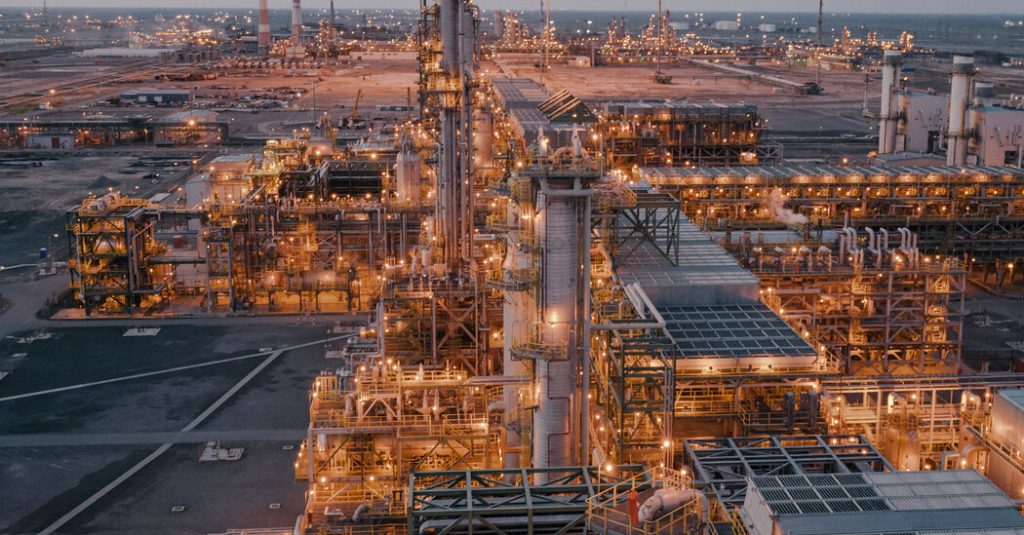Oil prices are falling. Economists are cutting forecasts for global economic growth. Oil giants are reporting lower profits.
But on Saturday, eight countries that belong to the oil cartel known as OPEC Plus said they would add about 411,000 barrels of oil a day in June. The move, which follows a similar step by the group to increase oil production at their April meeting, is a major shift in policy that will ripple through the wider energy industry, hitting profits of oil companies and forcing cutbacks.
The group said in a statement that the market was “healthy” and noted that oil inventories remained low.
Saudi Arabia, the de facto leader of OPEC Plus, is signaling that it is reluctant to hold back millions of barrels a day of oil that it could produce, especially when other members of the group, like Kazakhstan and Iraq, are not observing their agreed-upon production ceilings.
“The view from Saudi Arabia, in particular, is that they no longer want to be the ones carrying the heaviest burden if other countries in the group are not showing sufficient commitment to doing their part,” said Richard Bronze, the head of geopolitics at Energy Aspects, a London research firm.
Demand for oil has not weakened significantly. Oil consumption increased by 1.2 million barrels a day in the first quarter of 2025, the most since 2023, according to the International Energy Agency in Paris. Analysts there and elsewhere, though, are cutting their forecasts for demand in anticipation of disruption from global trade tensions, which has already slammed prices.
Prices of Brent crude, the international benchmark, have fallen close to 20 percent since April 3, when the Saudis and other producers signaled they would increase production.
The price of West Texas Intermediate, the American benchmark, slipped this week below $60 a barrel, a threshold where many producers can no longer make a profit, and analysts say that prices could fall further. Under such pressures, producers with higher costs, like shale drillers in the United States, which have been increasing output in recent years while OPEC restrained production, may be forced to cut back.
“To the extent that OPEC Plus cannot or will not reduce output at any time to support prices, the burden of shoring them up would fall on other higher-cost producers,” wrote analysts at S&P Global Commodity Insights.
Saudi Arabia and the United Arab Emirates, considered the main decision makers among oil producers these days, may also be more inclined to bolster the ambitions of President Trump, who is expected to visit Saudi Arabia and other Middle East countries soon, than they were in aiding his predecessor, Joseph R. Biden Jr.
This price drop “represents one of the most important economic bright spots” for the Trump administration, Helima Croft, head of global commodities at RBC Capital Markets, an investment bank, wrote in a recent note to clients. Mr. Trump has promised to lower energy costs, including gas prices, for consumers.
Saudi Arabia and the United Arab Emirates may be hoping for some concessions in deals in defense or artificial intelligence, where both countries have strong ambitions, analysts say. Already, the Trump administration is reviving talks on a nuclear partnership with Saudi Arabia.
Typically, OPEC Plus would be scrambling to cut supplies to bolster markets. Such calculations have clearly changed among a smaller group of eight OPEC Plus members, including Saudi Arabia, Russia and the United Arab Emirates. They have instead been unwinding an earlier agreement to restrain their production by about 2.2 million barrels a day.
Of late, this smaller group has been meeting to make deals, leaving the rest of OPEC Plus in the rear seat. Saudi Arabia, which seems to be running the process, is gaining the largest of the increases.
“It really comes down to whether Saudi Arabia and the United Arab Emirates are willing to cut production further to support prices,” said Bhushan Bahree, an executive director at S&P Global.
So far, the answer is no.
The United Arab Emirates is one of several producers, along with Kazakhstan and Iraq, that has an interest in raising production to accommodate the added output from oil and gas investments by international companies.
Kazakhstan produced about 400,000 barrels a day above its OPEC Plus ceiling in March, according to the International Energy Agency. In the same period, Iraq exceeded its ceiling by 440,000 barrels a day and the United Arab Emirates by 350,000.
Kazakhstan seems reluctant to rein in investors like Chevron and Exxon Mobil, which recently spent tens of billions of dollars to raise production to one million barrels a day at the Tengiz oil field in the country.
“We don’t engage in discussions about OPEC or OPEC Plus targets,” Mike Wirth, Chevron’s chairman and chief executive, told analysts on Friday during an earnings call. Mr. Wirth added that Tengiz was an important source of revenue for the Kazakhstan government and had not been “curtailed” historically.
“We follow national interests, strictly observing our international obligations,” the Kazakhstan Energy Ministry said in an emailed statement.


